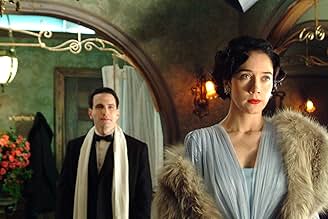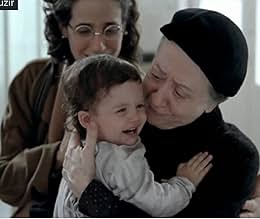Olga
- 2004
- 2 घं 21 मि
अपनी भाषा में प्लॉट जोड़ेंBased upon the true story of Olga Benário, the German-born wife of Brazilian communist leader Luís Carlos Prestes. During the dictatorship of Getúlio Vargas (1930-1945) she was arrested and ... सभी पढ़ेंBased upon the true story of Olga Benário, the German-born wife of Brazilian communist leader Luís Carlos Prestes. During the dictatorship of Getúlio Vargas (1930-1945) she was arrested and sent to Nazi Germany, where she was put to death in a concentration camp. After World War ... सभी पढ़ेंBased upon the true story of Olga Benário, the German-born wife of Brazilian communist leader Luís Carlos Prestes. During the dictatorship of Getúlio Vargas (1930-1945) she was arrested and sent to Nazi Germany, where she was put to death in a concentration camp. After World War II began, Vargas decided to support the Allies.
- पुरस्कार
- 16 जीत और कुल 17 नामांकन
- Léo Benário
- (as Luis Mello)
- Arthur Ewert
- (as Werner Schunemann)
कहानी
क्या आपको पता है
- ट्रिवियाThis is second time Eliane Giardini was the mother of Camila Morgado. The first one was in A Casa das Sete Mulheres (2003), also directed by Jayme Monjardim. This mini-series tells the story of Anita Garibaldi, after whom Olga named her daughter.
- कनेक्शनReferenced in Mussum, Um filme do Cacildis (2019)
Olga Benario (Camila Morgado) was born to a Jewish family in Munich, Germany on February 12, 1908. She became a militant and in 1925 went to Berlin where she continued her career. In 1926 she is arrested for treason, but is released a few weeks later. In 1928, she leads a cinematic assault on the court to free her partner Otto Braun (Guilherme Weber). The two then flee to Moscow where Olga is acclaimed, undergoes military training and a career in the Comintern. In 1934 Olga is assigned to guarantee the safe arrival in Brazil of the communist leader Luís Carlos Prestes (Caco Ciocler) where he would lead the Communist Intentona of 1935. They should pass as husband and wife to facilitate their disguise. On the long journey they fall in love.
With the failure of the revolution, Olga and Prestes are arrested and separated. Pregnant with Prestes, Olga struggles to have her daughter in Brazil. When Anita (her daughter) was 14 months old, she was taken from Olga and given to her grandmother Leocádia (Fernanda Montenegro), a fact that Olga only found out about later. In 1938 Olga was transferred to the Lichtenburg concentration camp and in 1939 to Ravensbrück, the only large women-only camp. There, Olga was a block leader and taught the other inmates. In February 1942 Olga was taken with 200 other prisoners to the Bernburg gas chamber where she was executed.
Technically, however, Olga is an example to be followed. The excellent art direction and scenography by Tiza Oliveira, Gelson Santos and Érika Lovisi and the costumes by Paulo Lois are excellent and very well recreate the former Soviet Union, Germany and Rio de Janeiro in the 1930s. Producer and screenwriter Rita Buzzar said at the press conference to publicize the film, which even considered filming on site, but in addition to making the project too expensive, the Germans demanded that the feature be directed by a local director. With the choice of Monjardim, remaking the director-writer duo of the telenovela Ana Raio and Zé Trovão (from the extinct TV Manchete), the solution was to transform the heat of Bangu into cold Europe, where Olga grew up and, in the end, suffered. Coarse salt on the ground and styrofoam flying made up for the snow. To hold the carioca sun, sheds of old fabric factories were used, which were completely sealed so that no ray of light could enter and give Ricardo Della Rosa (director of photography) full power to make the film monochromatic. From there, the scenarios were reconstituted in studios in Rio de Janeiro. With that in mind, the sets were well done from a historical perspective, staying true to the era portrayed.
The entire film uses cool, pastel colors. The protagonist's blue eyes are constantly being highlighted and it can even be said that the colors match in order to highlight this trait (perhaps even excessively). Especially at the beginning of the film, the colors are mostly cool and the presence of many shades of gray is noticeable. These characteristics may be intended to refer to the period of coal-fired factories and the European winter (see figure 1). Less evidently, it may have the idea of a withdrawn, harsh and dark communism. However, at some point in the film this changes. At the moment when the characters representing Olga Benário and Luis Carlos Prestes fall in love, the colors become more vivid and the lighting brighter, indicating that it was a happy moment, a moment of hope.
Another important scene to evaluate the colors (or the absence of them) is when Olga gives birth to Anita, her daughter with Prestes. In a white room and without any movement or life of a prison in Berlin, the only one to move and show expression is the protagonist, meaning that as much as the situation was sad and brought hopelessness, the birth of the girl gave back life and a little of joy that was in the lives of the characters - which proves to be a mistake with the arrival of the ending. The final scene is perhaps the most shocking. In a totally gray setting, Olga and other people are murdered in a gas chamber. Even the inmates' bodies are greyed, representing the sadness, horror and inhumanity of the episode.
The cast shows total intimacy with characters and time. Camila Morgado and Caco Ciocler have good chemistry and underwent physical transformations to form the couple Olga Benario and Luís Carlos Prestes Prestes. Camila underwent training in the army, shooting lessons and lost 11 kg, in addition to having her hair dyed, cut and finally shaved. Kermit also lost his locks and had to shave his beard. The difference in height between the two - Olga was 1.75m and Prestes was only 1.59m - was minimized by camera angles and huge heels on the actress's feet. Fernanda Montenegro also manages to act with perfection (for a change). In the role of Leocádia, mother of Luis Carlos Prestes, she is perfect. It manages to show the drama of the mother who knows she will never see her son again (when he leaves for Brazil) and fights for his and Olga's rights to freedom (this is well after the middle of the film, when they are arrested).
But if the actors are good and technically the film is one of the best made around here, where is the problem? Olga's main flaw is her script. Rita and Monjardim chose to show mainly the romance between the two, which emerged when Olga was Prestes' bodyguard and responsible for bringing him back to Brazil, so that he could command the first communist revolution in South America, deposing Getúlio Vargas from power. Disguised as a wealthy Portuguese couple on their honeymoon, the Jewish woman of bourgeois origins, but communist ideology, and the Brazilian leader, head of the famous Coluna Prestes, fall in love and what was a make-believe becomes real.
Jayme Monjardim managed to transform a cinematographic plot into a soap opera story, creating an atmosphere of love in the midst of revolution and only did not extend it any longer because we are finally talking about a film with more than 2 hours and 20 minutes of projection (too tiring) and not of a novel of 150 chapters. The film's dramatic content is enormous (read when they take Olga's daughter from her custody), which leaves the main and most interesting point of the story, politics, visibly aside. They transformed the revolutionary Luis Carlos Prestes into a transparent being on stage. Ridiculously invisible when Olga is in the making (for the most part). Even because Camila Morgado with those beautiful hypnotic eyes doesn't let you divert your attention from her interpretation.
Entire scenes of the romance between Olga and Prestes could very well have been left out of the final edition to, who knows, only be released later on DVD. The whole process of showing the two of them falling in love is extremely annoying and usual - you've seen it before. Scenes such as the sex scenes, or the separation between the two are soap operas in the extreme - extreme bad taste. The characters, then, are seen as fools, as their idealisms are lost in the midst of suffering words of love. Everything is shown as in a great soap opera, and so it can be said that a chance to create a small classic in national cinema was lost.
Another irritating point of the film is its manipulative character. Typical of television, this gimmick is a big negative face-to-face if taken to the movies so blatantly. Close-ups on sad faces; incessant baby crying; slow motion when the protagonist is beaten by the Nazis; mellow music in sad moments and scenes of romance... examples abound to illustrate the manipulation that Monjardim tries to execute on its spectators. Finally, another irritating point is the insistence on mixing languages in the film. One hour Olga speaks German and then speaks Portuguese. There is no problem in setting, even if the film takes place in Germany, all the lines are in Portuguese, as long as a standard is maintained. There is no justification for the comings and goings of languages spoken during the film. Another wrong choice by the director.
In fact, even taking place in a heavy period both in Brazil (with Vargas' Estado Novo) and in Europe (the strengthening of Nazi-fascism), the film has almost no heavy scenes. The tortures that took place on Brazilian soil, whose police had training with the Gestapo (Nazi police), and Hitler's concentration camps are softened. According to screenwriter Rita Buzzar, the film's theme is already heavy, so we decided to show a little bit of everything. We dose not to be a low blow, not to abuse the spectator. The hardest blow of the tape is the separation of Olga and Anita, in a great performance by Camila, when the 14-month-old girl is taken from her mother.
Reducing a story of struggle, resistance and conviction to a novelistic novel was a somewhat childish choice by the director, and perhaps even irresponsible and disrespectful to the memory of this figure so important and inspiring to so many that was Olga Benário, designed to please an average audience. Interested more in romance than politics, uncommitted to reporting on the true implications of Olga's story.
- fernandoschiavi
- 4 नव॰ 2022
- परमालिंक
टॉप पसंद
- How long is Olga?Alexa द्वारा संचालित
विवरण
बॉक्स ऑफ़िस
- बजट
- R$1,20,00,000(अनुमानित)
- दुनिया भर में सकल
- $60,820
- चलने की अवधि2 घंटे 21 मिनट
- रंग
- ध्वनि मिश्रण
इस पेज में योगदान दें




























